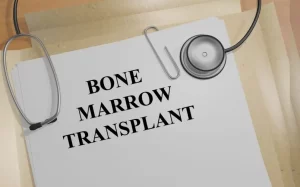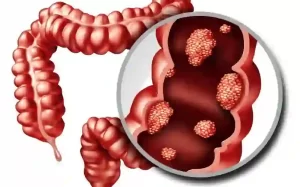“A 42-year-old patient from Botswana was admitted for metastasis of the colon. She was suffering from pain in the chest cough, backache, weight gain, and breathlessness. On investigations, it was discovered that cancer had spread to the bone and liver. The patient was on chemotherapy cycles. Dr. Boman Dhabar, medical oncologist advised palliative management and chemotherapy as the prognosis was poor…..”
Understanding colorectal cancer:
According to Global Cancer Statistics, colorectal cancer is the third most common type of cancer worldwide in humans. And the most alarming fact is the high rate of occurrence of this cancer among young adults.
Colorectal cancer includes cases of colon or rectum cancer or both. Depending on where it starts, this cancer is termed colon cancer or rectal cancer. It is also known as bowel cancer. The cancerous growth, tumor, or lump that grows inside the colon and/or rectum can be benign or malignant.
Signs and Symptoms observed in patients:
Some of the common symptoms of colorectal cancer are alteration in normal bowel habits, such as diarrhea or constipation, rectal bleeding, black or bloody stool, blood from the rectum, iron deficiency, persistent abdominal discomforts, and unexplained weight loss.
In spite of the high rate of occurrence, the death rate from colorectal cancer has reduced for over 20 years with the onset of improved screening techniques and advancement in treatment procedures.
Why super specialty hospitals like Wockhardt Hospitals can effectively manage such cases:
1) Advanced Diagnostic Facilities:
Cutting-edge screening techniques can detect polyps before they become cancerous and help in the early detection of colon cancer when the chances of a cure are much higher.
Some of the most common screening and diagnostic procedures for colorectal cancer are fecal occult blood test, stool DNA test, flexible sigmoidoscopy, Barium enema X-ray, colonoscopy, CT colonography, and imaging scans.
These diagnostic tools are available at super-specialty hospitals for evaluation and correct diagnosis
2) Management and Treatment by medical and surgical oncology department:
Varieties of colorectal cancer treatment procedures are practiced including chemotherapy, radiotherapy, biological therapy, and surgery. The treatment procedure of colorectal cancer depends on several factors, such as size, location, and stage of cancer, whether it is recurrent, and the overall health condition of the patient
Surgery is the only procedure that can cure colorectal cancer. All other treatments like chemotherapy and radiotherapy can only reduce the risk of recurrence of cancer after surgery but cannot cure. The surgical treatment procedures are of various types including Bowel Diversion Surgeries, Radiofrequency Ablations, Cryosurgery, Polypectomy, and Colectomy. Mainly three types of surgeries are practiced depending on the stage of colorectal cancer, such as Colonoscopy, Laparoscopy, and open surgery.
Laparoscopic surgery for colon cancer is a modern surgical technique, which has several advantages compared to the general open surgical procedure. The advantages are the reduced amount of pain due to smaller incisions, reduced blood loss, and faster recovery.
Conventional open rectal cancer surgery is difficult as the rectum remains hidden deep in the pelvis.
Laparoscopic surgery in rectal cancer performed in super-specialty hospitals can provide superior results to a rectal cancer patient. In laparoscopic surgery, the trauma is comparatively less, which makes the treatment more acceptable to the patient. Computer-assisted robotic surgery for rectal cancer allows the surgeons to conduct the surgeries more precisely. Robotic surgery makes it possible to preserve the anus in a greater number of patients
Oncology Services at Wockhardt Hospitals:
At Wockhardt Hospital we believe that diagnosis and management of a cancer patient do not end with the treatment of cancer, and hence it follows a well-designed patient counseling services and support system and forms part of goals in our oncology department. Our oncology team at Wockhardt Hospital uses cutting-edge technology & the latest pharmaceuticals to provide complete treatment for cancer.
At Wockhardt Hospitals, our esteemed and dedicated team of oncologist team provides both inpatient and outpatient services for patients diagnosed with cancer. This care is delivered by a multidisciplinary team of oncologists working together. Our oncologists at Wockhardt hospital along with expertise in this vast field and supported with advanced technology assist in providing the best quality patient care to our cancer patients in the administration of chemotherapy and radiation oncology.
The Department of Surgical Oncology is the only surgical oncology department for cancer treatment in North Mumbai and it aims to provide holistic, all-round surgical care for solid tumors comprising of Head & Neck Cancers, Breast Cancer, and Cancers of the female reproductive organs. Our qualified surgeons all have specialized fellowship training and work in a multidisciplinary setting with other specialists to provide the latest treatments and innovations in surgical cancer care.
Our centers at Wockhardt Hospital also provide nutrition support and other therapies to manage the side effects of cancer treatment.
Latest surgical techniques through minimally invasive surgery, stem cell transplantation, and latest chemotherapy adjuvants form part of the care in the oncology specialty at our units in Wockhardt Hospital. Wockhardt Hospital specializes in treatments for all hematological disorders such as different types of anemia, hematological malignancies, bleeding, and thrombotic disorders, and Bone marrow and stem cell transplantation. Wockhardt Hospitals is a state-of-the-art infrastructure whose prime objective is patient safety first and quality of care at the core of its strategy. The guiding philosophy is to serve and enrich the Quality of Life of patients and to make life win.




